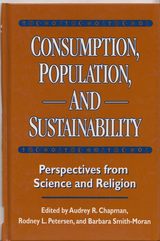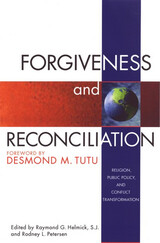
The combined contributions of science and religion to resolving environmental problems are far greater than each could offer working in isolation. Scientific findings are central to understanding the impact of human populations on the environment, but a more ecologically sustainable future will require radical changes in values, lifestyle choices, and consumption patterns -- a revolution that falls squarely within the domain of the religious community.
Consumption, Population, and Sustainability is an outgrowth of a conference sponsored jointly by the Boston Theological Institute and the American Association for the Advancement of Science that brought together more than 250 scientists and people of religious faith to discuss the environmental impact of consumption patterns and population trends, and to consider alternative and more equitable value systems, economic arrangements, and technologies that will be necessary for achieving a more sustainable future. The book:
- provides a brief history of the dialogue between science and religion on environmental issues
- outlines potential contributions of the religious community to the debate about global sustainability
- offers a science-based assessment of issues such as carrying capacity, sustainability indicators, and the environmental impacts of consumer-based lifestyles
- considers religious and theological perspectives on consumption and population from a variety of viewpoints including Roman Catholic, Jewish, Greek Orthodox, and Islamic
- examines the ethical and policy dimensions of reorienting today's consumer society to one more focused on values, spiritual growth, and relationships.
Both the scientific and religious communities can make important contributions to understanding and responding to the impact of population growth and consumption patterns on environmental sustainability. This volume represents a significant step in establishing an ongoing dialogue between the communities, and provides a thought-provoking overview of the issues for scientists, theologians, and anyone concerned with the future of global sustainability.

This book brings together a unique combination of experts in conflict resolution and focuses on the role forgiveness can play in the process. It deals with theology, public policy, psychological and social theory, and social policy implementation of forgiveness. This book is essential for libraries, scholars, conflict negotiators, and all people who hope to understand the role of forgiveness in the peace process.
The book's first section explores how ideas like "forgiveness" and "reconciliation" are moving out from the seminary and academy into the world of public policy and how these terms have been used and defined in the past. The second section looks at forgiveness and public policy. One of the chapters, by Donald W. Shriver Jr., addresses forgiveness in a secular political forum.
The third section of the book draws us to a more thorough analysis of the relationship between forgiveness and reconciliation from voices in the academic and theological community, and the final section highlights the work of practitioners currently working with religion, public policy, and conflict transformation, particularly in areas such as Ireland and Africa.
Contributors include Desmond M. Tutu, Rodney L. Petersen, Miroslav Volf, Stanley S. Harakas, Raymond G. Helmick, SJ, Joseph V. Montville, Douglas M. Johnston, Donna Hicks, Donald W. Shriver, Jr., Everett L. Worthington, Jr., John Paul Lederach, Ervin Staub, Laurie Anne Pearlman, John Dawson, Audrey R. Chapman, Olga Botcharova, Anthony da Silva, SJ, Geraldine Smythe, OP, Andrea Bartoli, Ofelia Ortega, and George F. R. Ellis.
READERS
Browse our collection.
PUBLISHERS
See BiblioVault's publisher services.
STUDENT SERVICES
Files for college accessibility offices.
UChicago Accessibility Resources
home | accessibility | search | about | contact us
BiblioVault ® 2001 - 2024
The University of Chicago Press









